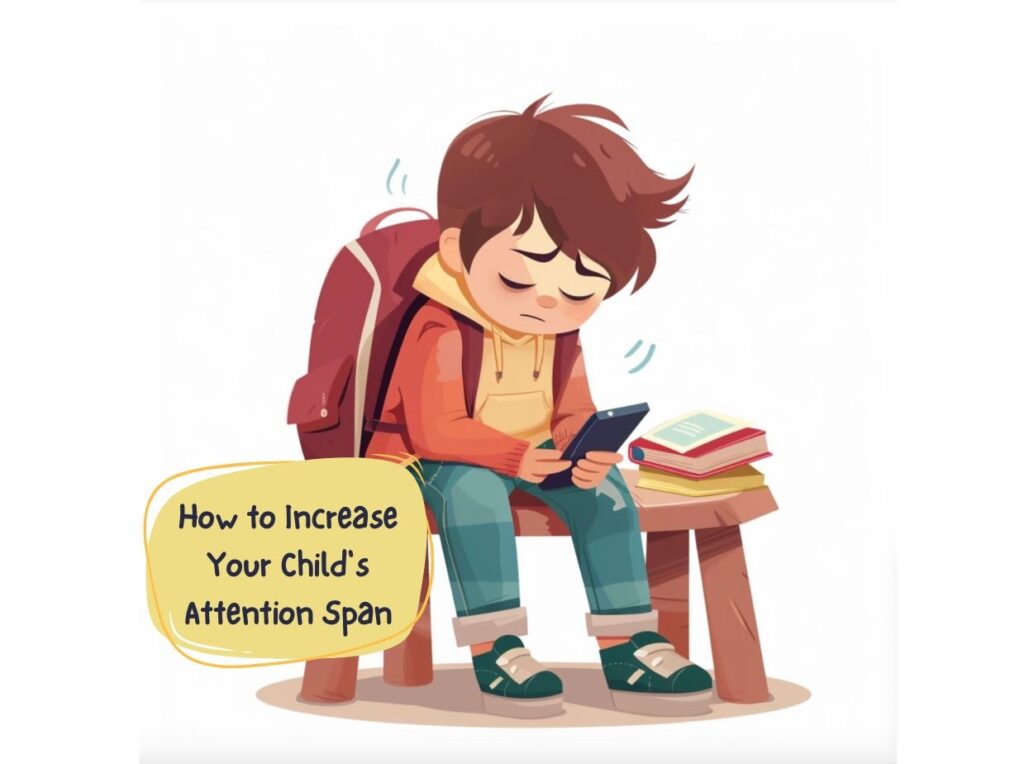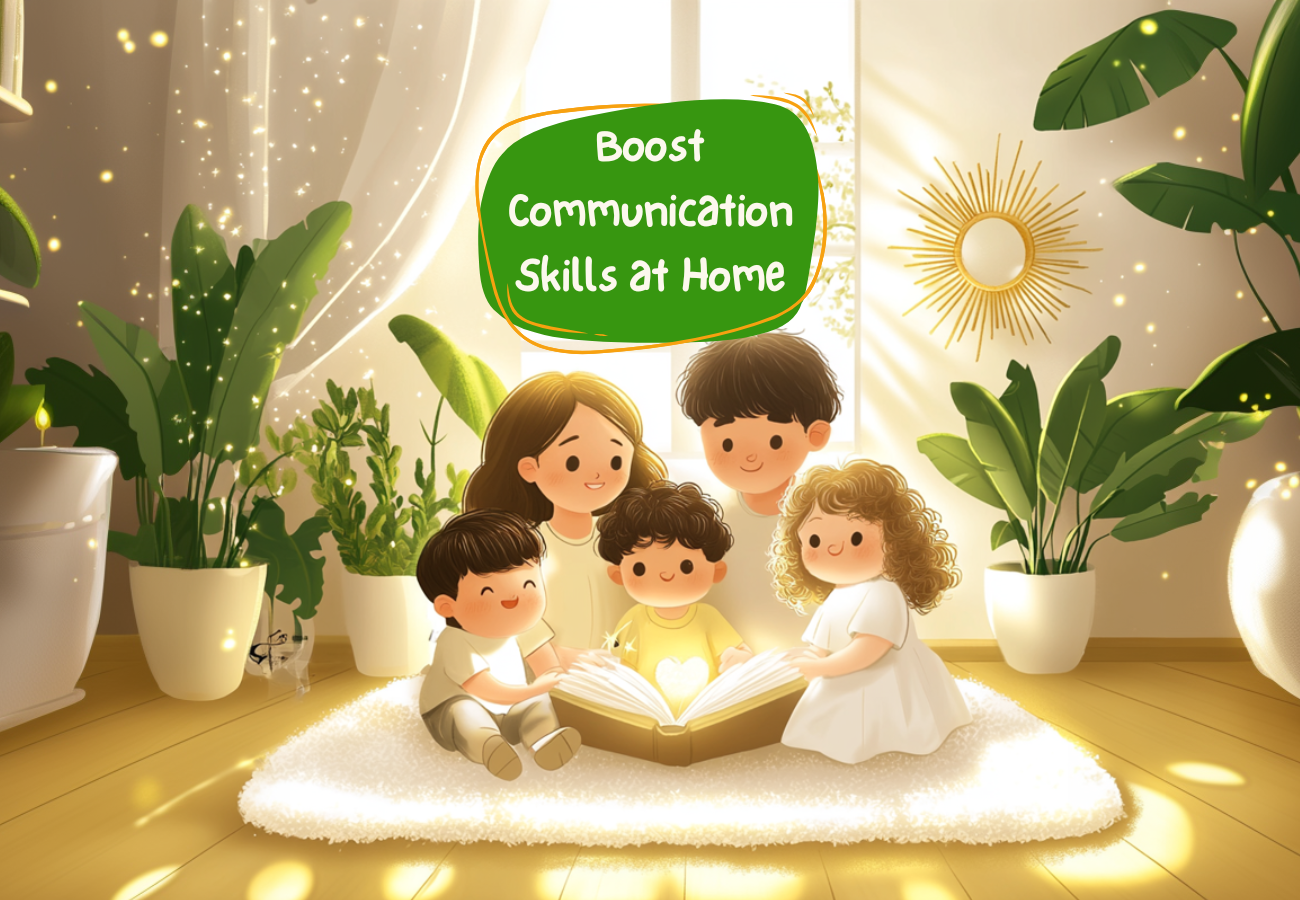How to Increase Your Child’s Attention Span

In the whirlwind of modern life, where distractions abound, and attention is a prized commodity, parents often grapple with concerns about their child’s ability to focus and sustain attention. In a world filled with screens, notifications, and endless stimuli, cultivating a robust attention span in children has become more challenging.
However, by understanding the factors that influence attention and implementing effective strategies, parents can play a pivotal role in helping their children develop stronger concentration skills essential for academic success and everyday life.
Understanding Attention Span
Attention span refers to when a person can concentrate on a task or activity without distraction. It is a multifaceted cognitive ability that plays a crucial role in learning, problem-solving, and overall cognitive functioning. There are different types of attention, including sustained attention (the ability to maintain focus over an extended period), selective attention (the ability to focus on specific stimuli while ignoring others), and divided attention (the ability to multitask or focus on multiple stimuli simultaneously).
Factors Influencing Attention
Several factors influence a child’s attention span, including age, temperament, environment, and individual interests. Younger children typically have shorter attention spans and may struggle to focus for extended periods compared to older children. Additionally, each child has a unique temperament that can affect their attentional abilities—some may be naturally more focused, while others may be easily distracted.
The environment also plays a significant role, with cluttered or noisy surroundings making it challenging for children to concentrate. Finally, children are more likely to pay attention to activities that align with their interests and preferences.
Establishing Routines and Structure
Establishing consistent routines and structured environments is an effective way to enhance your child’s attention span. Predictable routines help children know what to expect and create a sense of stability, which can support attention and focus. Set aside specific times for activities such as homework, chores, and play, and create designated spaces free from distractions. Minimize background noise, such as TV or loud music, during focused activities to help your child concentrate better.
Encouraging Active Engagement
Children are more likely to stay engaged and focused when actively involved in activities that capture their interest and stimulate their curiosity. Instead of passively consuming information, encourage your child to participate actively in learning experiences. Incorporate hands-on activities, experiments, and interactive games encouraging exploration and problem-solving. For example, conduct simple experiments instead of simply reading about science concepts to reinforce learning and promote engagement.
Limiting Screen Time
Excessive screen time can harm children’s attention span and cognitive development. The constant barrage of stimuli from screens can overstimulate the brain and interfere with the ability to focus on other tasks. Set reasonable limits on your child’s screen time and encourage alternative activities that promote engagement and learning. Encourage outdoor play, creative pursuits, and social interactions with peers to provide a healthy balance to screen-based activities.
Practicing Mindfulness and Relaxation Techniques
Mindfulness and relaxation techniques can be valuable tools for improving attention and reducing stress in children. Teach your child simple mindfulness exercises, such as deep breathing, body scans, or mindful listening, to help them stay present and focused. These practices can help children develop self-awareness and emotional regulation, which are essential for maintaining attention and managing distractions effectively.
Encouraging Physical Activity and Healthy Habits
Regular physical activity, adequate sleep, and a balanced diet are fundamental aspects of a healthy lifestyle that support optimal cognitive function, including attention span. Encourage your child to engage in regular physical activity, whether playing sports, riding bikes, or walking. Ensure they get enough sleep each night, as sleep deprivation can impair attention and cognitive performance. Additionally, provide nutritious meals and snacks that fuel their bodies and brains for optimal focus and concentration.

Activities to Improve Your Child’s Attention Span
Enhancing your child’s attention span is crucial to their cognitive development. As a parent, you play a vital role in fostering this skill through engaging in activities that capture their interest and challenge their focus. Here are several activities designed to improve your child’s attention span:
1. Puzzle Games: Introduce your child to age-appropriate puzzle games such as jigsaw puzzles, Sudoku, or matching games. These activities require concentration and problem-solving skills, helping to strengthen their attention span.
2. Reading Together: Set aside time to read with your child each day. Choose books that align with their interests and abilities. Reading together promotes bonding and encourages sustained attention as they follow the storyline and engage with the content.
3. Art and Crafts: Encourage creativity through art and craft projects. Provide materials like crayons, markers, paints, and clay, and let your child explore their imagination. Completing art projects requires focus and attention to detail.
4. Board Games: Board games are an excellent way to promote attention span while having fun as a family. Games like chess, Monopoly, or Scrabble require strategic thinking and sustained concentration to play effectively.
5. Nature Walks: Take your child on nature walks or hikes where they can observe and interact with their surroundings. Encourage them to notice details like plant species, animal tracks, or environmental changes. Connecting with nature can help improve attention and reduce stress.
6. Cooking Together: Involve your child in meal preparation activities. Assign them simple tasks like mixing ingredients, chopping vegetables (under supervision), or setting the table. Cooking requires following instructions and paying attention to the task at hand.
7. Music and Dance: Engage your child in musical activities such as singing, playing instruments, or dancing. Music stimulates various parts of the brain and can enhance concentration. Encourage them to focus on learning new songs or mastering dance moves.
8. Memory Games: Play memory-enhancing games like Simon Says, memory cards, or “I Spy.” These games challenge your child’s working memory and ability to focus on relevant information while ignoring distractions.
9. Building Blocks and Legos: Provide blocks or Lego sets for your child to construct various structures or follow instructions to build specific designs. These activities promote spatial awareness, problem-solving, and sustained attention as the child concentrates on building.
10. Mindfulness Activities: Teach your child simple mindfulness exercises like deep breathing, body scans, or mindful listening. These techniques help calm the mind, improve focus, and reduce impulsivity.
11. Outdoor Sports: Encourage your child to participate in outdoor sports and physical activities such as soccer, basketball, or swimming. Sports require focus, coordination, and attention to the game dynamics, fostering improved attention span.
12. Journaling or Diary Writing: Encourage your child to keep a journal or diary where they can write about their thoughts, experiences, or daily activities. Writing promotes self-reflection and concentration as they organize their thoughts and express themselves on paper.
Incorporating these activities into your child’s daily routine can help them develop and strengthen their attention span while fostering their overall cognitive development and well-being. Adjust the activities based on your child’s interests, abilities, and age to ensure maximum engagement and enjoyment.
Conclusion
In conclusion, nurturing a child’s attention span requires a multifaceted approach encompassing environmental modifications, engaging activities, and holistic well-being. By understanding the factors that influence attention and implementing practical strategies such as establishing routines, limiting screen time, and promoting mindfulness, parents can empower their children to develop stronger attention skills and thrive in today’s fast-paced world.
Parents can play a crucial role in helping their children unlock their full potential and succeed in academics, relationships, and life by being patient, consistent, and supportive.
As parents, caregivers, and educators, we must recognize that enhancing attention span is a gradual process that requires ongoing effort and adaptation. By incorporating these strategies into everyday routines and interactions, we can create environments that support children’s attentional development and set them on a path to success.
Disclosure: This blog article contains promotional links. We may receive a commission or other benefits for placing links at no additional cost to you. Our recommendations are based on our honest opinions and experiences.
More articles

Tips for Parents to Boost Their Child’s Communication Skills at Home
Effective communication forms the foundation of a child’s academic success, social relationships, and emotional well-being. However, for many children, mastering these skills presents a significant challenge. According to recent data, nearly 1 in 12 U.S. children aged 3–17 has experienced a disorder related to voice, speech, language, or swallowing within the past year. Among them, […]

Helping Kids Who Struggle to Sit Still and Stay Calm
Some children move through the world with nonstop energy that rarely seems to slow down. They bounce, fidget, tap their feet, or speak out when quiet is expected. These behaviors can feel overwhelming for parents, teachers, and caregivers trying to create calm. Is the child being defiant or simply overstimulated? Are they anxious, under-challenged, or […]

Teaching Kids to Celebrate Differences Through Books
Why Books Matter in Teaching Kids About Differences Teaching kids to celebrate differences through books is one of the most effective and natural ways to build a more inclusive future. Stories have long served as windows into other lives, cultures, and perspectives. When children read books that highlight diversity, inclusion, and empathy, they begin to […]



